Rachel Weisz Disobedience Interview
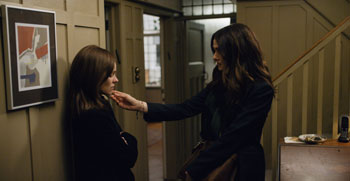
Set in an Orthodox Jewish Community
Cast: Rachel Weisz, Rachel McAdams, Alessandro Nivola
Director: Sebastián Lelio
Genre: Drama, Romance
Rated: MA15+
Running Time: 114 minutes
Synopsis: In a Jewish Orthodox Synagogue in Hendon, the frail Rav Krushka (Anton Lesser) collapses whilst giving a sermon. As funeral rites commence in London, the Rabbi's exiled daughter Ronit Khruska (Rachel Weisz) is living her life as a photographer in Manhattan. During a photo shoot she is told by the Brooklyn Synagogue of her father's death; wounded by the news and in a vulnerable state, she gets drunk in a local bar and sleeps with an undetermined man.
Ronit flies home to London where she feels out of place in the Orthodox Jewish community she left behind. She is greeted at the home of Dovid Kuperman (Alessandro Nivola), a son figure to the Rav, who is taken aback by the unexpected return of his childhood friend. Her welcome inside the home is hostile from those in the community gathering in the Rav's honour. Her aunt Fruma Hartog (Bernice Stegers) greets her more openly, though the air is frosty between Ronit and her uncle Moshe Hartog (Allan Corduner). Ronit is both upset and angry that she was not informed of her father's illness and that her father's obituary claims he was childless.
Despite tension surrounding Ronit's sudden departure in the past, Dovid invites her to stay with him and his wife. Ronit is shocked to discover that he is married to their former best friend Esti (Rachel McAdams), now a teacher at an Orthodox girls' school. It is uncomfortable between the two women; a complicated past is clearly hanging over them. The next day Ronit visits her father's grave. After further prayers at their home, Dovid, Esti and Ronit go to a dinner at the Hartog house with Rabbi Goldfarb (Nicholas Woodeson) and Rebbetzin Goldfarb (Liza Sadovy). Ronit tries to talk to her Uncle about selling her father's house, but he tells her now is not the right time for such a topic. Conversation turns to Ronit's successful career as a photographer and Rebbetzin questions why she goes by Ronnie Curtis after seeing one of her photos in a magazine. Esti, quietly joining in the conversation, states that women change their names all the time when they get married and lose their own history. Everyone is silently shocked at Esti's controversial comment.
Rebbetzin continues questioning Ronit's life in New York and asks why she is still not married, as it's the way it should be for a woman. Ronit disagrees, calling marriage an institutional obligation and if she had stayed in the community and been married off, she would have killed herself. Everyone is shocked by her outburst and Ronit, blaming her jet lag, excuses herself to go home. Dovid, upon Esti's request, leaves to walk her home. Ronit breaks down to Dovid, hoping her father knew she truly loved him. Dovid, struggling against the rules of his religion, tries to comfort his childhood friend without touching her.
 Ronit visits her uncle Hartog at his wigmaker's shop to continue the discussion of selling her father's house, but is informed by Hartog that the Rav left the house and all its contents to the Synagogue. She leaves and soon runs into Esti outside a supermarket. They visit the Rav's house together – a rundown mess full of medical equipment, it is not so much the house that Ronit wanted, but for her father to acknowledge her in his will. Esti admits that she does not want Ronit to leave again; past feelings are reignited and they kiss, at first timidly as Ronit pulls back, and then passionately. Ronit retreats once more, confused about her feelings.
Ronit visits her uncle Hartog at his wigmaker's shop to continue the discussion of selling her father's house, but is informed by Hartog that the Rav left the house and all its contents to the Synagogue. She leaves and soon runs into Esti outside a supermarket. They visit the Rav's house together – a rundown mess full of medical equipment, it is not so much the house that Ronit wanted, but for her father to acknowledge her in his will. Esti admits that she does not want Ronit to leave again; past feelings are reignited and they kiss, at first timidly as Ronit pulls back, and then passionately. Ronit retreats once more, confused about her feelings.
They leave the house and Esti confesses that she had called the Brooklyn Synagogue to let Ronit know of her father's death. She tells Ronit that she married Dovid, a man she doesn't love romantically but respects, as she was mentally unwell following Ronit's sudden departure and married their best friend upon the Rav's suggestion. As they relax into each other's company and kiss again, they are interrupted by Hinda (Clara Francis) and husband Lev (Mark Stobbart) and are unsure how much they saw. Esti rushes home, tense; she almost embraces Dovid but their marriage still lacks the passion she has with Ronit. At school, Esti is summoned to see the headmistress Mrs Shapiro (Caroline Gruber) where Hinda and Lev are waiting to confront her. Allegations about Esti and Ronit also plague Dovid when he is asked by the Synagogue to take on the Rav's work.
Ronit waits for Esti at the school gates, where Esti tells her about the formal complaint Hinda and Lev have submitted against her. Upon Ronit's suggestion, they escape the close knit community and head into central London for the day. Ronit and Esti continue to be conflicted in their attraction to one other; Esti feels guilty and is trying to lead a good life in line with her faith, but cannot help but desire her former lover. They go to a hotel where they make love, completely at ease and euphoric in each other's company. They talk about how Ronit's father first learnt of their relationship all those years ago.
Esti returns home late at night, where Dovid is waiting in their bedroom. He tries to get close to her but his yearning to be intimate with his wife is rebuked once again by a confused Esti. Nauseous the next day, Esti begins to wonder if she is pregnant. Dovid confronts Esti about Mrs Shapiro's accusations and she admits what happened between them. Dovid's anger almost turns violent as he releases his frustration at his wife's inability to embrace their life together. Ronit, having overheard the argument, tries to persuade Esti to leave her husband, but Esti struggles to come to a decision. They both try to convince each other, and themselves, they are happy in their lives.
Unable to cope with the current events, Dovid seeks refuge in a quiet Synagogue library. The atmosphere is tense when he returns home for dinner with Ronit and Esti. When Ronit announces that she has booked a flight back to New York that night, Dovid seems relieved and quietly asked his wife what she plans on doing now. Ronit and Esti share a difficult goodbye, both unable to share their true feelings. Esti accuses Ronit of taking the easy option by leaving, Ronit storms out the house and Esti slams the door behind her; both heartbroken at the recent events.
In the middle of the night, Esti leaves the house whilst Dovid is asleep and returns to the hotel room with a pregnancy test. Waking up at the airport the next morning, Ronit receives a panicked phone call from Dovid saying Esti is missing. After trying to calm him down, she continues to check into her flight, but later decides to leave and help Dovid in the search for her.
Returning home after failing in their search for Esti, Ronit is still angry that Dovid didn't tell her of her father's illness. Esti returns from hiding and, having heard everything, announces her pregnancy. Dovid is joyous, believing a child will solve all their marital problems, but Esti instead asks for freedom for her and her child. She was born into the community and wants to give her child the freedom of choice she never had. Dovid is speechless and Esti feels guilty for crushing her husband's dreams of becoming a father.
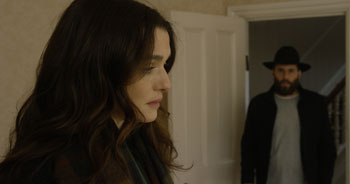 Ronit and Esti attend the Hesped at the Synagogue, intimidated by the judgemental looks they receive. Esti tries to make peace with Dovid, but he ignores her. Moved by the temple's sacred atmosphere, Ronit asks Esti to be with her in New York. They clutch hands as Dovid takes to the podium, where he struggles to deliver the official speech on the Rav's passing. Seeing Ronit in the crowd, he instead contemplates the notion of freedom and choice, a topic that the Rav spoke about in his final sermon, and grants Esti the autonomy she has requested. Dovid declines the Synagogue position and abruptly leaves the Hesped. Outside, overcome with emotion Esti and Dovid hug. Ronit watches on in the distance until Dovid extends an arm and the three friends have a long heartfelt hug together.
Ronit and Esti attend the Hesped at the Synagogue, intimidated by the judgemental looks they receive. Esti tries to make peace with Dovid, but he ignores her. Moved by the temple's sacred atmosphere, Ronit asks Esti to be with her in New York. They clutch hands as Dovid takes to the podium, where he struggles to deliver the official speech on the Rav's passing. Seeing Ronit in the crowd, he instead contemplates the notion of freedom and choice, a topic that the Rav spoke about in his final sermon, and grants Esti the autonomy she has requested. Dovid declines the Synagogue position and abruptly leaves the Hesped. Outside, overcome with emotion Esti and Dovid hug. Ronit watches on in the distance until Dovid extends an arm and the three friends have a long heartfelt hug together.
The next morning, Ronit prepares to leave for the airport. She bids a quiet farewell to Dovid outside his bedroom and goes to see Esti, who has slept on the sofa. They say goodbye; it seems Esti has decided against joining Ronit in New York. As Ronit's taxi pulls away down the street, Esti runs after her and the pair share a long goodbye kiss, promising to remain in contact. An emotional Ronit visits her father's grave one last time and takes a photo, achieving a sense of closure over his passing and the recent events.
Disobedience
Release Date: June 14th, 2018
Director: Sebastián Lelio
Genre: Drama, Romance
Rated: MA15+
Running Time: 114 minutes
Synopsis: In a Jewish Orthodox Synagogue in Hendon, the frail Rav Krushka (Anton Lesser) collapses whilst giving a sermon. As funeral rites commence in London, the Rabbi's exiled daughter Ronit Khruska (Rachel Weisz) is living her life as a photographer in Manhattan. During a photo shoot she is told by the Brooklyn Synagogue of her father's death; wounded by the news and in a vulnerable state, she gets drunk in a local bar and sleeps with an undetermined man.
Ronit flies home to London where she feels out of place in the Orthodox Jewish community she left behind. She is greeted at the home of Dovid Kuperman (Alessandro Nivola), a son figure to the Rav, who is taken aback by the unexpected return of his childhood friend. Her welcome inside the home is hostile from those in the community gathering in the Rav's honour. Her aunt Fruma Hartog (Bernice Stegers) greets her more openly, though the air is frosty between Ronit and her uncle Moshe Hartog (Allan Corduner). Ronit is both upset and angry that she was not informed of her father's illness and that her father's obituary claims he was childless.
Despite tension surrounding Ronit's sudden departure in the past, Dovid invites her to stay with him and his wife. Ronit is shocked to discover that he is married to their former best friend Esti (Rachel McAdams), now a teacher at an Orthodox girls' school. It is uncomfortable between the two women; a complicated past is clearly hanging over them. The next day Ronit visits her father's grave. After further prayers at their home, Dovid, Esti and Ronit go to a dinner at the Hartog house with Rabbi Goldfarb (Nicholas Woodeson) and Rebbetzin Goldfarb (Liza Sadovy). Ronit tries to talk to her Uncle about selling her father's house, but he tells her now is not the right time for such a topic. Conversation turns to Ronit's successful career as a photographer and Rebbetzin questions why she goes by Ronnie Curtis after seeing one of her photos in a magazine. Esti, quietly joining in the conversation, states that women change their names all the time when they get married and lose their own history. Everyone is silently shocked at Esti's controversial comment.
Rebbetzin continues questioning Ronit's life in New York and asks why she is still not married, as it's the way it should be for a woman. Ronit disagrees, calling marriage an institutional obligation and if she had stayed in the community and been married off, she would have killed herself. Everyone is shocked by her outburst and Ronit, blaming her jet lag, excuses herself to go home. Dovid, upon Esti's request, leaves to walk her home. Ronit breaks down to Dovid, hoping her father knew she truly loved him. Dovid, struggling against the rules of his religion, tries to comfort his childhood friend without touching her.
 Ronit visits her uncle Hartog at his wigmaker's shop to continue the discussion of selling her father's house, but is informed by Hartog that the Rav left the house and all its contents to the Synagogue. She leaves and soon runs into Esti outside a supermarket. They visit the Rav's house together – a rundown mess full of medical equipment, it is not so much the house that Ronit wanted, but for her father to acknowledge her in his will. Esti admits that she does not want Ronit to leave again; past feelings are reignited and they kiss, at first timidly as Ronit pulls back, and then passionately. Ronit retreats once more, confused about her feelings.
Ronit visits her uncle Hartog at his wigmaker's shop to continue the discussion of selling her father's house, but is informed by Hartog that the Rav left the house and all its contents to the Synagogue. She leaves and soon runs into Esti outside a supermarket. They visit the Rav's house together – a rundown mess full of medical equipment, it is not so much the house that Ronit wanted, but for her father to acknowledge her in his will. Esti admits that she does not want Ronit to leave again; past feelings are reignited and they kiss, at first timidly as Ronit pulls back, and then passionately. Ronit retreats once more, confused about her feelings. They leave the house and Esti confesses that she had called the Brooklyn Synagogue to let Ronit know of her father's death. She tells Ronit that she married Dovid, a man she doesn't love romantically but respects, as she was mentally unwell following Ronit's sudden departure and married their best friend upon the Rav's suggestion. As they relax into each other's company and kiss again, they are interrupted by Hinda (Clara Francis) and husband Lev (Mark Stobbart) and are unsure how much they saw. Esti rushes home, tense; she almost embraces Dovid but their marriage still lacks the passion she has with Ronit. At school, Esti is summoned to see the headmistress Mrs Shapiro (Caroline Gruber) where Hinda and Lev are waiting to confront her. Allegations about Esti and Ronit also plague Dovid when he is asked by the Synagogue to take on the Rav's work.
Ronit waits for Esti at the school gates, where Esti tells her about the formal complaint Hinda and Lev have submitted against her. Upon Ronit's suggestion, they escape the close knit community and head into central London for the day. Ronit and Esti continue to be conflicted in their attraction to one other; Esti feels guilty and is trying to lead a good life in line with her faith, but cannot help but desire her former lover. They go to a hotel where they make love, completely at ease and euphoric in each other's company. They talk about how Ronit's father first learnt of their relationship all those years ago.
Esti returns home late at night, where Dovid is waiting in their bedroom. He tries to get close to her but his yearning to be intimate with his wife is rebuked once again by a confused Esti. Nauseous the next day, Esti begins to wonder if she is pregnant. Dovid confronts Esti about Mrs Shapiro's accusations and she admits what happened between them. Dovid's anger almost turns violent as he releases his frustration at his wife's inability to embrace their life together. Ronit, having overheard the argument, tries to persuade Esti to leave her husband, but Esti struggles to come to a decision. They both try to convince each other, and themselves, they are happy in their lives.
Unable to cope with the current events, Dovid seeks refuge in a quiet Synagogue library. The atmosphere is tense when he returns home for dinner with Ronit and Esti. When Ronit announces that she has booked a flight back to New York that night, Dovid seems relieved and quietly asked his wife what she plans on doing now. Ronit and Esti share a difficult goodbye, both unable to share their true feelings. Esti accuses Ronit of taking the easy option by leaving, Ronit storms out the house and Esti slams the door behind her; both heartbroken at the recent events.
In the middle of the night, Esti leaves the house whilst Dovid is asleep and returns to the hotel room with a pregnancy test. Waking up at the airport the next morning, Ronit receives a panicked phone call from Dovid saying Esti is missing. After trying to calm him down, she continues to check into her flight, but later decides to leave and help Dovid in the search for her.
Returning home after failing in their search for Esti, Ronit is still angry that Dovid didn't tell her of her father's illness. Esti returns from hiding and, having heard everything, announces her pregnancy. Dovid is joyous, believing a child will solve all their marital problems, but Esti instead asks for freedom for her and her child. She was born into the community and wants to give her child the freedom of choice she never had. Dovid is speechless and Esti feels guilty for crushing her husband's dreams of becoming a father.
 Ronit and Esti attend the Hesped at the Synagogue, intimidated by the judgemental looks they receive. Esti tries to make peace with Dovid, but he ignores her. Moved by the temple's sacred atmosphere, Ronit asks Esti to be with her in New York. They clutch hands as Dovid takes to the podium, where he struggles to deliver the official speech on the Rav's passing. Seeing Ronit in the crowd, he instead contemplates the notion of freedom and choice, a topic that the Rav spoke about in his final sermon, and grants Esti the autonomy she has requested. Dovid declines the Synagogue position and abruptly leaves the Hesped. Outside, overcome with emotion Esti and Dovid hug. Ronit watches on in the distance until Dovid extends an arm and the three friends have a long heartfelt hug together.
Ronit and Esti attend the Hesped at the Synagogue, intimidated by the judgemental looks they receive. Esti tries to make peace with Dovid, but he ignores her. Moved by the temple's sacred atmosphere, Ronit asks Esti to be with her in New York. They clutch hands as Dovid takes to the podium, where he struggles to deliver the official speech on the Rav's passing. Seeing Ronit in the crowd, he instead contemplates the notion of freedom and choice, a topic that the Rav spoke about in his final sermon, and grants Esti the autonomy she has requested. Dovid declines the Synagogue position and abruptly leaves the Hesped. Outside, overcome with emotion Esti and Dovid hug. Ronit watches on in the distance until Dovid extends an arm and the three friends have a long heartfelt hug together. The next morning, Ronit prepares to leave for the airport. She bids a quiet farewell to Dovid outside his bedroom and goes to see Esti, who has slept on the sofa. They say goodbye; it seems Esti has decided against joining Ronit in New York. As Ronit's taxi pulls away down the street, Esti runs after her and the pair share a long goodbye kiss, promising to remain in contact. An emotional Ronit visits her father's grave one last time and takes a photo, achieving a sense of closure over his passing and the recent events.
Disobedience
Release Date: June 14th, 2018
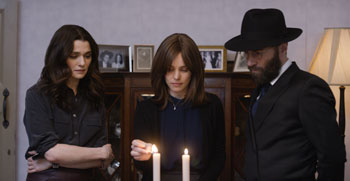 Interview with Rachel Weisz
Interview with Rachel Weisz
Question: What attracted you to this project?
Rachel Weisz: I was looking for material to develop, as well as produce and act in. Disobedience was one of the first projects I found; it's an incredible story, with two great female leads. What really grabbed me about the novel was the theme of transgression in the modern world where there is almost nothing taboo anymore. The term disobedience means very little unless you find the right community to set it in, like the small Orthodox Jewish community in North London. If you find a story of transgression within an ordered old fashioned society, I think you have a great universal drama that anyone can relate to.
Question: What was it like to develop the book into a film?
Rachel Weisz: It took about three years from when I optioned the book, to when we started filming. I found the process of working with Sebastián, who joined the project six months later, really exciting. It was an incredible journey transforming and mutating the book into its own entity through long discussions and script meetings.
Question: What was it like to work with Sebastián Lelio?
Rachel Weisz: I've seen his work, particularly Gloria. He was the first person who was offered the book to develop and he said yes immediately. I was stunned because he's a filmmaker coming from such a different cultural background, so he had to really investigate this society and religion like a cultural anthropologist. As an outsider, the way in which he saw the world was very different from had it been a British director. So it's great that he had to immerse himself in the society from a really different point of view. I love the fact that he doesn't really have antagonists in his film. For instance, Uncle Hartog in the book is a much nastier piece of work, but in the script he's just someone who doesn't agree with my character. Everyone contains within them their own antagonist and worst enemy and that's what interests him.
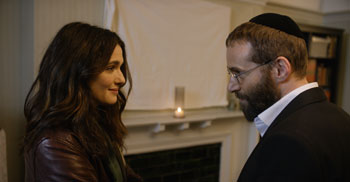 Question: What was Ronit's relationship like with her father?
Question: What was Ronit's relationship like with her father?
Rachel Weisz: Ronit is living with her guilt that she has erased her father from her own life after he disowned her. When she left, she chose not get in contact with him. There is this regret of being too late to forgive each other. To find forgiveness and peace with a parent before they die is incredibly important to carry on with your life. A part of her story is about how you can leave where you're from, but you can't really leave it behind; you carry it with you wherever you go. You think you are free living your life, but you need to find closure on certain things. For Ronit not to be contacted about her father's illness, she's denied closure to come and say goodbye which is very painful.
Question: What is Ronit's relationship with Judaism?
Rachel Weisz: I see Ronit as a teenager who questioned the religious laws; her free liberal thinking is immensely dangerous to the tiny closed community. Why should women get married and wear a wig? Why can't she drive on a Saturday? There are so many rules and laws and Ronit questioned them hard and was seen as a rebel and anti-authoritarian as a result.
Question: Can you tell us about the character of Esti and working with Rachel McAdams?
Rachel Weisz: Rachel McAdams is a great actress and has a huge range. She read the script and it really spoke to her. Esti is a gay woman who is in a loving heterosexual marriage. In her religion, homosexuality is considered a sin, but she believes in god so she's trying to do the right thing by her marriage. She is in a lot of psychological pain because of this decision and Ronit's return releases all her desire to be free. At the same time, she doesn't view her life as a prison because she loves Dovid as a dear friend. It's a really complicated role and I think Rachel brings a sense of Esti's inner torture and suffering and then transforms into someone who finds freedom.
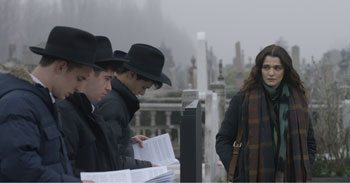 Question: Can you tell us about the character Dovid and working with Alessandro Nivola?
Question: Can you tell us about the character Dovid and working with Alessandro Nivola?
Rachel Weisz: Dovid is an innately conservative and spiritual man, who was Ronit's father's favourite student. Growing up, Ronit was jealous of their relationship because they could sit around talking about Judaism for hours, which didn't appeal to Ronit. So there's always been a bit of sibling rivalry between the two of them, but Dovid is a decent, morally good man. Even though the community is warning him about the trouble Ronit could bring, he knows she is mourning her father and should be involved. When his decency is tested in a very serious way, he discovers an existential spirituality outside any given doctrine, and Alessandro has really tapped into that and the sense of righteousness that you need play a Rabbi.
Question: What was it like to work with cinematographer Danny Cohen?
Rachel Weisz: Danny Cohen shot Room in one incredibly private space, so he's very skilled at creating drama in very small confined spaces. He's an incredible visual story teller and the story felt really important to him. He grew up in the same street as me in North London so we had endless conversations about the same tree we climbed as kids.
Disobedience
Release Date: June 14th, 2018
Rachel Weisz: I was looking for material to develop, as well as produce and act in. Disobedience was one of the first projects I found; it's an incredible story, with two great female leads. What really grabbed me about the novel was the theme of transgression in the modern world where there is almost nothing taboo anymore. The term disobedience means very little unless you find the right community to set it in, like the small Orthodox Jewish community in North London. If you find a story of transgression within an ordered old fashioned society, I think you have a great universal drama that anyone can relate to.
Question: What was it like to develop the book into a film?
Rachel Weisz: It took about three years from when I optioned the book, to when we started filming. I found the process of working with Sebastián, who joined the project six months later, really exciting. It was an incredible journey transforming and mutating the book into its own entity through long discussions and script meetings.
Question: What was it like to work with Sebastián Lelio?
Rachel Weisz: I've seen his work, particularly Gloria. He was the first person who was offered the book to develop and he said yes immediately. I was stunned because he's a filmmaker coming from such a different cultural background, so he had to really investigate this society and religion like a cultural anthropologist. As an outsider, the way in which he saw the world was very different from had it been a British director. So it's great that he had to immerse himself in the society from a really different point of view. I love the fact that he doesn't really have antagonists in his film. For instance, Uncle Hartog in the book is a much nastier piece of work, but in the script he's just someone who doesn't agree with my character. Everyone contains within them their own antagonist and worst enemy and that's what interests him.
 Question: What was Ronit's relationship like with her father?
Question: What was Ronit's relationship like with her father? Rachel Weisz: Ronit is living with her guilt that she has erased her father from her own life after he disowned her. When she left, she chose not get in contact with him. There is this regret of being too late to forgive each other. To find forgiveness and peace with a parent before they die is incredibly important to carry on with your life. A part of her story is about how you can leave where you're from, but you can't really leave it behind; you carry it with you wherever you go. You think you are free living your life, but you need to find closure on certain things. For Ronit not to be contacted about her father's illness, she's denied closure to come and say goodbye which is very painful.
Question: What is Ronit's relationship with Judaism?
Rachel Weisz: I see Ronit as a teenager who questioned the religious laws; her free liberal thinking is immensely dangerous to the tiny closed community. Why should women get married and wear a wig? Why can't she drive on a Saturday? There are so many rules and laws and Ronit questioned them hard and was seen as a rebel and anti-authoritarian as a result.
Question: Can you tell us about the character of Esti and working with Rachel McAdams?
Rachel Weisz: Rachel McAdams is a great actress and has a huge range. She read the script and it really spoke to her. Esti is a gay woman who is in a loving heterosexual marriage. In her religion, homosexuality is considered a sin, but she believes in god so she's trying to do the right thing by her marriage. She is in a lot of psychological pain because of this decision and Ronit's return releases all her desire to be free. At the same time, she doesn't view her life as a prison because she loves Dovid as a dear friend. It's a really complicated role and I think Rachel brings a sense of Esti's inner torture and suffering and then transforms into someone who finds freedom.
 Question: Can you tell us about the character Dovid and working with Alessandro Nivola?
Question: Can you tell us about the character Dovid and working with Alessandro Nivola? Rachel Weisz: Dovid is an innately conservative and spiritual man, who was Ronit's father's favourite student. Growing up, Ronit was jealous of their relationship because they could sit around talking about Judaism for hours, which didn't appeal to Ronit. So there's always been a bit of sibling rivalry between the two of them, but Dovid is a decent, morally good man. Even though the community is warning him about the trouble Ronit could bring, he knows she is mourning her father and should be involved. When his decency is tested in a very serious way, he discovers an existential spirituality outside any given doctrine, and Alessandro has really tapped into that and the sense of righteousness that you need play a Rabbi.
Question: What was it like to work with cinematographer Danny Cohen?
Rachel Weisz: Danny Cohen shot Room in one incredibly private space, so he's very skilled at creating drama in very small confined spaces. He's an incredible visual story teller and the story felt really important to him. He grew up in the same street as me in North London so we had endless conversations about the same tree we climbed as kids.
Disobedience
Release Date: June 14th, 2018
Have You Seen This?
MORE







